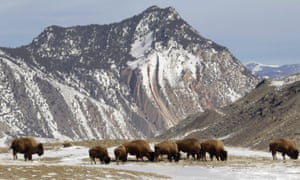National park authorities want to kill one in five animals to bring population down to target size

Yellowstone National Park is proposing to reduce its celebrated bison herd by 1,000 animals this winter by rounding up those wandering into adjacent Montana and delivering them to Native American tribes for slaughter, officials said on Wednesday.
The longstanding but controversial annual culling is designed to lessen the risk of straying Yellowstone bison infecting cattle herds in Montana with brucellosis, a bacterial disease carried by many bison, also known as buffalo.
Yellowstone bison, the nation’s last sizeable herd of wild, purebred buffalo, are a top attraction for the millions of tourists who annually visit the park, which spans parts of Wyoming, Montana and Idaho.
The size of the bison culling varies from year to year, and removing 1,000 animals this winter would mark the largest single reduction since more than 1,600 were taken from the herd in the winter of 2007-2008.
The herd was estimated to number some 4,900 head this summer, and the culling – mostly females – is aimed at bringing it closer to its target population of about 3,000 animals.
Brucellosis, which can cause pregnant cows and other animals to miscarry their young, is at the centre of a perennial dispute between Montana ranchers and wildlife advocates over management of Yellowstone’s bison. Ranchers also worry about bison overgrazing lands needed to feed livestock.
Federal, state and tribal officials managing the bison are to review the latest culling proposal on Thursday and adopt a final plan before winter.
“No formal decision has been made, but the park proposal is for 1,000 fewer bison,” park spokeswoman Amy Bartlett said.
Weather is a key factor, with fewer animals likely to migrate out of Yellowstone’s high country to lower elevations in search of food outside the park if snowfall is light.
“You can’t predict how many bison will go into the trap,” Montana state veterinarian Marty Zaluski said. “Nature has a way of defying your best expectations.“
More than 700 bison were culled last year, most of them captured and turned over to tribes for slaughter but some killed through hunting. Some tribes, such as the Nez Perce in Idaho, support the program while others oppose it.
Jimmy St. Goddard, a spiritual leader of the Blackfeet Tribe in Montana, said the culling, for him, evokes a painful chapter of American history in which US extermination campaigns pushed the massive, hump-backed creatures to the edge of extinction.
“Killing these buffalo is shameful,” he said.

